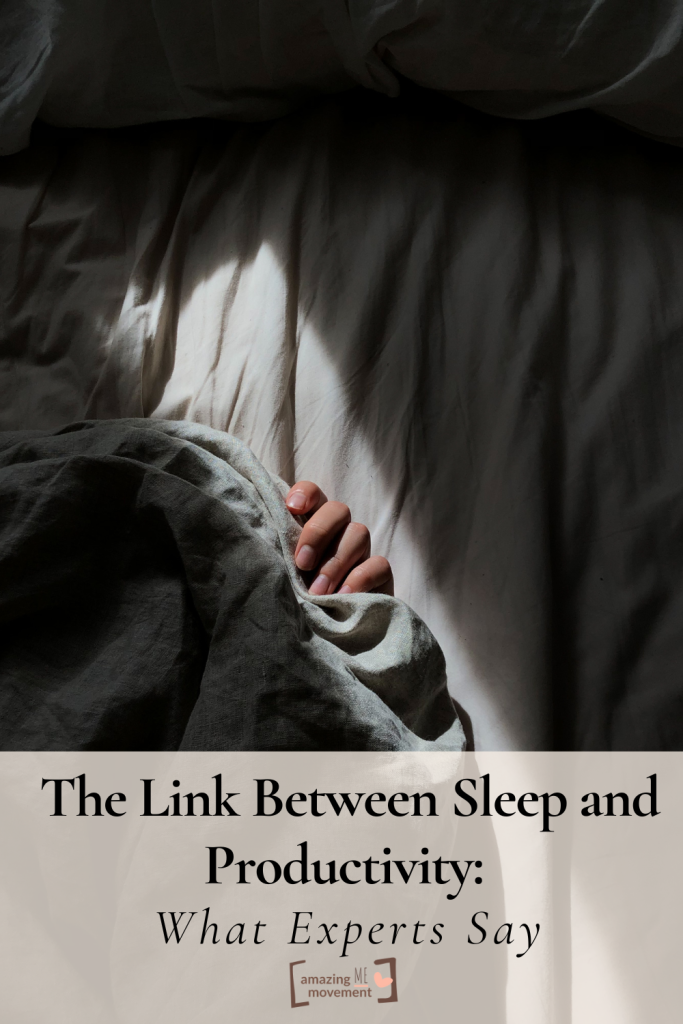In today’s fast-paced world, where women juggle multiple roles—from career woman to mother, partner, and friend—the pursuit of productivity often takes center stage. We strive to maximize our output, optimize our schedules, and achieve our goals. But amidst this relentless pursuit, one crucial element is often overlooked: sleep. This article delves into the profound connection between sleep and productivity, exploring science-backed strategies to help you prioritize rest and unlock your full potential.

The Productivity Paradox: Why Less Sleep Equals Less Done
It’s tempting to believe that sacrificing sleep will grant us extra hours to conquer our to-do lists. However, research paints a different picture. Sleep deprivation has a detrimental impact on various cognitive functions essential for productivity:
- Impaired Focus and Attention: Sleep loss makes it difficult to concentrate, maintain focus, and resist distractions. This translates to decreased efficiency and an increased likelihood of errors.
- Reduced Cognitive Performance: Sleep plays a vital role in memory consolidation, problem-solving, and decision-making. When we’re sleep-deprived, these cognitive abilities suffer, hindering our capacity to perform complex tasks and make sound judgments.
- Decreased creativity and Innovation: Sleep is crucial for creative thinking and generating new ideas. Lack of sleep can stifle our imagination and limit our ability to think outside the box.
- Mood Swings and Emotional Instability: Sleep deprivation can lead to irritability, anxiety, and heightened emotional reactivity. These mood fluctuations can disrupt our interactions, hinder teamwork, and negatively impact our overall well-being.

The Sleep-Productivity Connection
To fully grasp the link between sleep and productivity, it’s essential to understand the science behind sleep. Sleep is not a passive state of inactivity; it’s an active process involving distinct stages, each with unique functions:
- Non-Rapid Eye Movement (NREM) Sleep: This stage is further divided into three sub-stages, ranging from light sleep to deep sleep. During NREM sleep, our body repairs tissues, builds bone and muscle, and strengthens the immune system.
- Rapid Eye Movement (REM) Sleep: This stage is characterized by rapid eye movements, increased brain activity, and vivid dreams. REM sleep is crucial for cognitive functions like memory consolidation, learning, and emotional processing.
A complete sleep cycle, encompassing both NREM and REM sleep, lasts approximately 90 minutes. We typically cycle through these stages multiple times during a night’s sleep. Disruptions to these cycles, caused by insufficient sleep or poor sleep quality, can impair our cognitive functions and diminish our productivity.

Tailoring Sleep Strategies for Women
While the importance of sleep applies to everyone, women face unique challenges that can impact their sleep quality and quantity:
- Hormonal Fluctuations: Throughout their lives, women experience significant hormonal shifts related to menstruation, pregnancy, and menopause. These fluctuations can disrupt sleep patterns and contribute to sleep disorders like insomnia.
- Caregiving Responsibilities: Women often bear a disproportionate share of caregiving responsibilities, whether for children, elderly parents, or other family members. These responsibilities can lead to fragmented sleep and increased stress, further impacting sleep quality.
- Societal Expectations: Women may face societal pressures to prioritize others’ needs over their own, leading to chronic sleep deprivation as they attempt to balance multiple roles and responsibilities.
Optimizing Sleep for Peak Productivity: Practical Strategies
Here are some science-backed tips to optimize your sleep and boost your productivity:
- Establish a Consistent Sleep Schedule: Go to bed and wake up at the same time every day, even on weekends. This helps regulate your body’s natural sleep-wake cycle, known as the circadian rhythm.
- Create a Relaxing Bedtime Routine: Wind down before bed with calming activities like reading, taking a warm bath, or listening to soothing music. Avoid stimulating activities like watching TV or using electronic devices close to bedtime.
- Optimize Your Sleep Environment: Ensure your bedroom is dark, quiet, and cool. Invest in a comfortable mattress and pillows. Consider using blackout curtains, earplugs, or a white noise machine to minimize distractions.
- Limit Caffeine and Alcohol Intake: Avoid caffeine and alcohol close to bedtime, as these substances can interfere with sleep quality. Caffeine is a stimulant that can keep you awake, while alcohol can disrupt sleep cycles.
- Engage in Regular Physical Activity: Regular exercise can improve sleep quality, but avoid strenuous workouts close to bedtime. Aim for at least 30 minutes of moderate-intensity exercise most days of the week.
- Manage Stress and Anxiety: Chronic stress and anxiety can significantly impact sleep. Practice relaxation techniques like deep breathing, meditation, or yoga to manage stress and promote relaxation.
- Prioritize Sleep as a Non-Negotiable: Recognize that sleep is not a luxury but a necessity for optimal health and productivity. Schedule sufficient time for sleep and treat it as a non-negotiable part of your daily routine.
- Seek Professional Help if Needed: If you consistently struggle with sleep despite implementing these strategies, consult a healthcare professional. They can help identify any underlying sleep disorders and recommend appropriate treatment options.

The Power of Prioritization: Reclaiming Your Time and Energy
In a culture that often glorifies busyness and undervalues rest, prioritizing sleep can feel like a radical act. However, by recognizing the profound connection between sleep and productivity, we can shift our perspective and embrace sleep as a powerful tool for self-improvement.
When we prioritize sleep, we’re not just investing in our physical and mental health; we’re also investing in our ability to perform at our best. By optimizing our sleep, we can unlock our full potential, enhance our productivity, and achieve our goals with greater ease and efficiency.
So, ladies, let’s reclaim our time and energy by prioritizing sleep. Let’s embrace rest as a vital component of our self-care routine and empower ourselves to thrive in all aspects of our lives. Remember, sleep is not a sign of weakness; it’s a sign of strength, resilience, and self-awareness.
Want more tips on optimizing your well-being? Explore other articles on our blog for expert advice and practical strategies.
Benefits of Gratitude: Finding Joy Through Science-Backed Studies
7 Ways How Depression Affects Work Performance And Outlook
5 Things You Need to Know Today As A Young Adult
- 10 Ways to Overcome Procrastination and Get Things Done – 03/03/2025
- How to Overcome Imposter Syndrome and Thrive – 27/02/2025
- 10 Time Management Hacks You’ll Wish You Knew Sooner – 27/02/2025









Leave a Reply